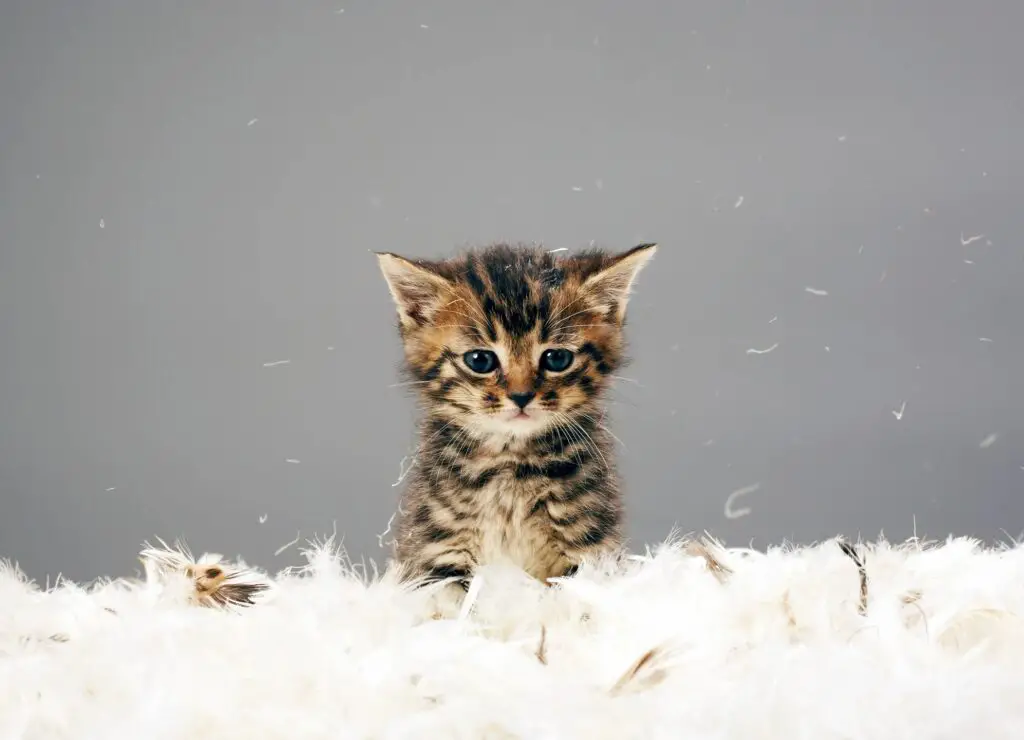There’s no doubt that your cat is territorial, and that means where it lives, its food, toys, and you. When that territory is challenged, your kitty gets nasty, reacting with aggression and showing displeasure. But seeing as you’ve brought an entirely new person into your life, do cats get jealous of babies?
Since cats don’t speak, you must surmise their feelings by the behavior they display. The appearance of a new baby threatens a cat’s feeling of control and security. Jealousy arises from not being the center of attention, and stress-related behavior includes hissing or attacking your child.
Anxiety and stress are the results of the smallest change in the environment of a cat, seeing as they’re creatures of habit. Cats become easily insecure and fear losing your attention, reacting the same way a sibling would of a new baby. Besides the impact of changes in your affection and their routine, read further to find how cats deal with jealousy over babies.
Can Cats Get Jelous?
Not unlike ourselves, cats have personality traits, and one happens to be jealousy. Or maybe it’s something else, but that’s how it’s commonly interpreted. Your feline may display aggression, hierarchical tendencies, over-protectiveness, eagerness for attention, and competitiveness.

Often, your cat is standoffish, only approaching when it requires feeding, a toy, or some head caresses. Whether it’s acting out, craving more attention, or being aggressive towards your newborn, cats do indeed get jealous. The problem is that cats aren’t particularly easy to study, seeing as they have a mind of their own.
There’s indeed no way of telling whether animals experience the same emotions that we do. But evolutionist biologist Sir Charles Darwin noted that he’d seen a dog getting jealous of his master’s affection. That’s if this love is lavished on something else. A man who didn’t conclude lightly, he wrote this while painstakingly putting together his famous theory based on natural selection and evolution.
However, similar observations were made by the 6th century BCE philosopher Pythagoras. He of the famed mathematical theorem mused that an animal had the same soul we do. After that ‘aha’ moment, the Greek genius became an animist, never eating meat, or wearing leather shoes again. He even spent money on captive animals at the market only to free them.
Signs That My Cat Is Jealous of My Newborn Baby
Seeing as there’s relatively little systematic empirical research on the subject of cat emotions, jealousy will manifest in various ways. Other than outright attention-seeking behavior, you’ll decipher your cat’s gazes, gaits, or body posture. These include
Aggression, Anxiety, and Unhappiness
You’ll notice changes in body language immediately your cat walks through the door where your baby is. There’ll probably be signs of tenseness and anxiety, such as crouching or tail tucking beneath the body. Your cat’s ears will be flattened against the head or drawn back with eye pupils dilated.
If your cat is angry or unhappy, you’ll see them standing ramrod straight or with their body held sideways. Fur is raised, heckles along the back, which is sometimes arched when your feline becomes alarmed. The mouth might also open with teeth showing, or it may try to come between you and your child with growls of frustration.

A cat will react differently to you when you’re holding your baby if that’s the object of its jealousy. Its aggression may become physical, swatting, or trying to scratch your child. It’ll also try keeping other cats or people at bay whenever approached. According to the ASPCA, these behaviors are defense mechanisms that mean your kitty feels threatened by the new tot’s presence.
Litter Box Issues
Aggressiveness, anger, or anxieties are easy to spot. Other problems associated with stress and frustration aren’t so openly displayed. A common behavioral problem in cats is feline inappropriate elimination or soiling and peeing outside the litter box.
You’ll start to notice funky smells or wet spots on furniture and other surfaces around the house. At other times, the kitty may merely over-scratch litter or go right next to their box.
Excessive Behavior
If none of the above symptoms of jealousy have manifested in your cat, they can also use normal behavior extensively to get on your nerves. You may notice your feline constantly meowing in another room, demanding your attention.
Excessive yowling is a reaction to the lack of treats, pets, or attention which can degenerate into destructive behavior. Over-grooming, also called feline psychogenic alopecia, is one of these, a displacement trait as a result of conflict or frustration anxiety and can become compulsive. Some felines also become reclusive, less active, and avoid time with you, while others refuse to eat or develop medical stress conditions.
Can You Prepare Your Cat for the Arrival of Your New Baby?
You can reduce the chances of your cat getting jealous of your newborn. That means taking matters into your hands earlier on, setting the precedent behavior way before your tot arrives. Having control over your kitty’s jealous reactions that sets a safe foundation includes understanding your cat’s tendencies.
You must answer questions like;
- Is your cat particularly clingy?
- Does it have a temper when things don’t go their way?
- Has it ever displayed unwanted behavior in other stressful situations as a coping mechanism?
Your will manifest its jealousy towards your baby in different ways. Even the most chilled kitty can suddenly become noisome, behaving peculiarly and displaying resentment against your new baby.
One way you can prepare your feline for the upcoming change is by seating the nursery or any kid’s stuff early. Let your cat get used to these items, but limit their exploration as the time for your baby draws near. You can place the double-sided sticky tape on baby furnishings, making them undesirable for kitty to sleep in.
Remember to provide your cat with new territory unencumbered by your baby’s stuff. If the nursery used to have a litter box, move it to another place and allow your feline to claim that space. I know mums who play baby noises on speakers so that their cats get used to the sounds. Others will have friends or relatives come over with babies so that your kitty gets used to the idea.
Conclusion
Cats indeed get jealous of babies, but you can put the scenario under control. Early preparation by a gradual introduction of baby-related items works to soften the impact for your kitty. It’s also vital that you continue spending time with your feline, initially without your child nearby. Start introducing these friends slowly but make sure you’re present whenever they’re both in the same room together.

I’m Cathrine and I’m a 39-year-old mother of 3 from Utica, New York. And I’m extremely happy you’ve come to visit my hide-out on the web. Here I post about everything related to family-life and usually it will involve babies and lessons I’ve learned over the years from experts, friends, and my own mistakes. So hopefully you will find what i write fun and informational!


